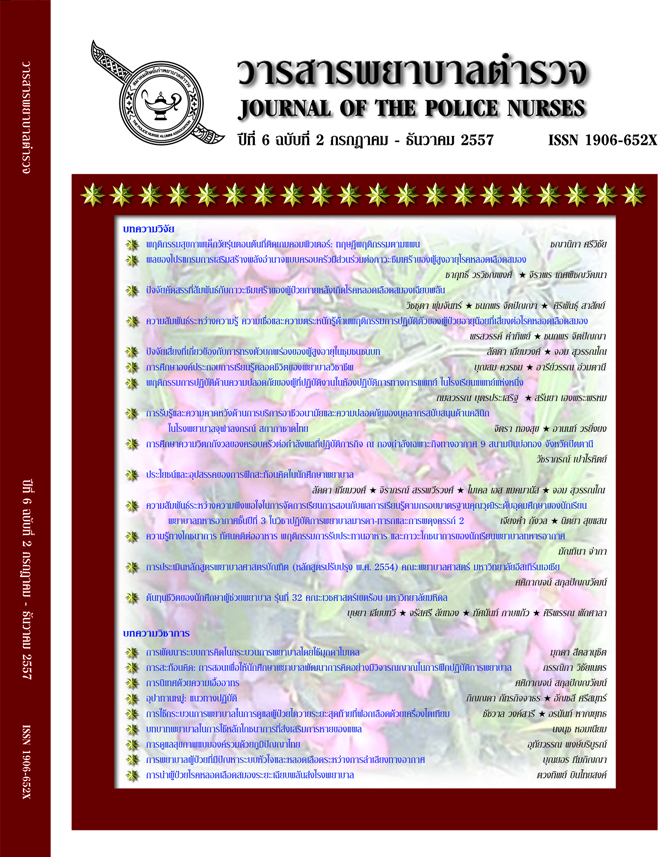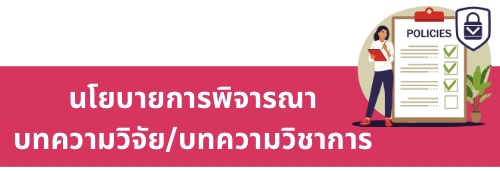ผลของโปรแกรมการเสริมสร้างพลังอำนาจแบบครอบครัวมีส่วนร่วมต่อภาวะซึมเศร้าของผู้สูงอายุโรคหลอดเลือดสมอง
คำสำคัญ:
การเสริมสร้างพลังอำนาจ, การมีส่วนร่วมของครอบครัว, ภาวะซึมเศร้า, ผู้สูงอายุ, โรคหลอดเลือดสมอง, Empowerment, Family Participation, Depression Older Persons, Strokeบทคัดย่อ
บทคัดย่อการวิจัยครั้งนี้มีวัตถุประสงค์เพื่อ 1) เปรียบเทียบภาวะซึมเศร้าของผู้สูงอายุโรคหลอดเลือดสมอง ระหว่างก่อนและหลังเข้าร่วมโปรแกรมการเสริมสร้างพลังอำนาจแบบครอบครัวมีส่วนร่วม 2) เปรียบเทียบภาวะซึมเศร้าของผู้สูงอายุโรคหลอดเลือดสมองระหว่างกลุ่มที่เข้าร่วมกับกลุ่มที่ไม่ได้เข้าร่วมโปรแกรมฯ รูปแบบการวิจัยเป็นการวิจัยกึ่งทดลองแบบสองกลุ่ม วัดก่อนและหลังการทดลอง โดยการจับคู่เพศ อายุ ระดับความสามารถในการประกอบกิจวัตรประจำวัน และระดับภาวะซึมเศร้า ตัวอย่างคือ ผู้สูงอายุโรคหลอดเลือดสมอง จำนวน 40 คน โดยคัดเลือกตัวอย่างที่มีคุณสมบัติตามเกณฑ์ที่กำหนด แบ่งเป็นกลุ่มควบคุมและกลุ่มทดลอง จำนวนกลุ่มละ 20 คน เครื่องมือที่ใช้ในการวิจัย ประกอบด้วยเครื่องมือ 2 ส่วน คือ 1) โปรแกรมการเสริมสร้างพลังอำนาจแบบครอบครัวมีส่วนร่วมที่ผู้วิจัยสร้างขึ้นตามแนวคิดการเสริมสร้างพลังอำนาจของ Gibson (1995) ร่วมกับแนวคิดการมีส่วนร่วมในการดูแลของ Sebern (2005) ได้ผ่านการตรวจสอบความตรงตามเนื้อหาจากผู้ทรงคุณวุฒิ 2) เครื่องมือเก็บรวบรวมข้อมูล ได้แก่ แบบประเมินภาวะซึมเศร้าในผู้สูงอายุไทย มีค่าความเที่ยงเท่ากับ 0.93 สถิติที่ใช้ในการวิเคราะห์ข้อมูล ได้แก่ ค่าเฉลี่ย ส่วนเบี่ยงเบนมาตรฐาน และสถิติทดสอบที
ผลการวิจัยที่สำคัญ สรุปได้ดังนี้
1. ภาวะซึมเศร้าของผู้สูงอายุโรคหลอดเลือดสมองในกลุ่มทดลองหลังเข้าร่วมโปรแกรมต่ำกว่าก่อนเข้าร่วมโปรแกรมการเสริมสร้างพลังอำนาจแบบครอบครัวมีส่วนร่วม อย่างมีนัยสำคัญทางสถิติ ที่ระดับ .05
2. ภาวะซึมเศร้าของผู้สูงอายุโรคหลอดเลือดสมองในกลุ่มที่เข้าร่วมโปรแกรมต่ำกว่ากลุ่มที่ไม่ได้เข้าร่วมโปรแกรมการเสริมสร้างพลังอำนาจแบบครอบครัวมีส่วนร่วม อย่างมีนัยสำคัญทางสถิติ ที่ระดับ .05
The Effect of Empowerment Program Emphasizing Family Participation on Depression of Older Persons with Stroke
Abstract
The purposes of this study were to 1) compare depression of older persons with stroke before and after participated in empowerment program emphasizing family participation 2) compare depression of older persons with stroke between the group participated in the empowerment program and the control group. The study design was Quasi-experimental with pre-posttest control group matching sex, age, Barthel ADL Index, and depression level. The participants were 40 older persons with stroke who met the inclusion criteria. They were randomly assigned into one experimental group with 20 subjects and control group with 20 subjects. Instruments of this study comprised with 2 parts which are: 1) Empowerment Program emphasizing family participation developed by the researcher based on Empowerment concept (Gibson, 1995) and Shared Care concept (Sebern, 2005) and were tested for content validity by the experts; 2) Data collecting instrument was Thai Geriatric Depression Scale (TGDS) with the reliability of 0.93. The data were analyzed using mean, standard deviation, and t-test.
Major findings were as follows:
1. Depression of older persons with stroke after participated in empowerment program emphasizing family participation were significantly lower than before participated program, at p= .05 level.
2. Depression of older persons with stroke who participated empowerment program emphasizing family participation were significantly lower than the control group, at p= .05 level.
Downloads
ดาวน์โหลด
รูปแบบการอ้างอิง
ฉบับ
ประเภทบทความ
สัญญาอนุญาต
ผลงานที่ได้ตีพิมพ์แล้วจะเป็นลิขสิทธิ์ของวารสารพยาบาลตำรวจ















